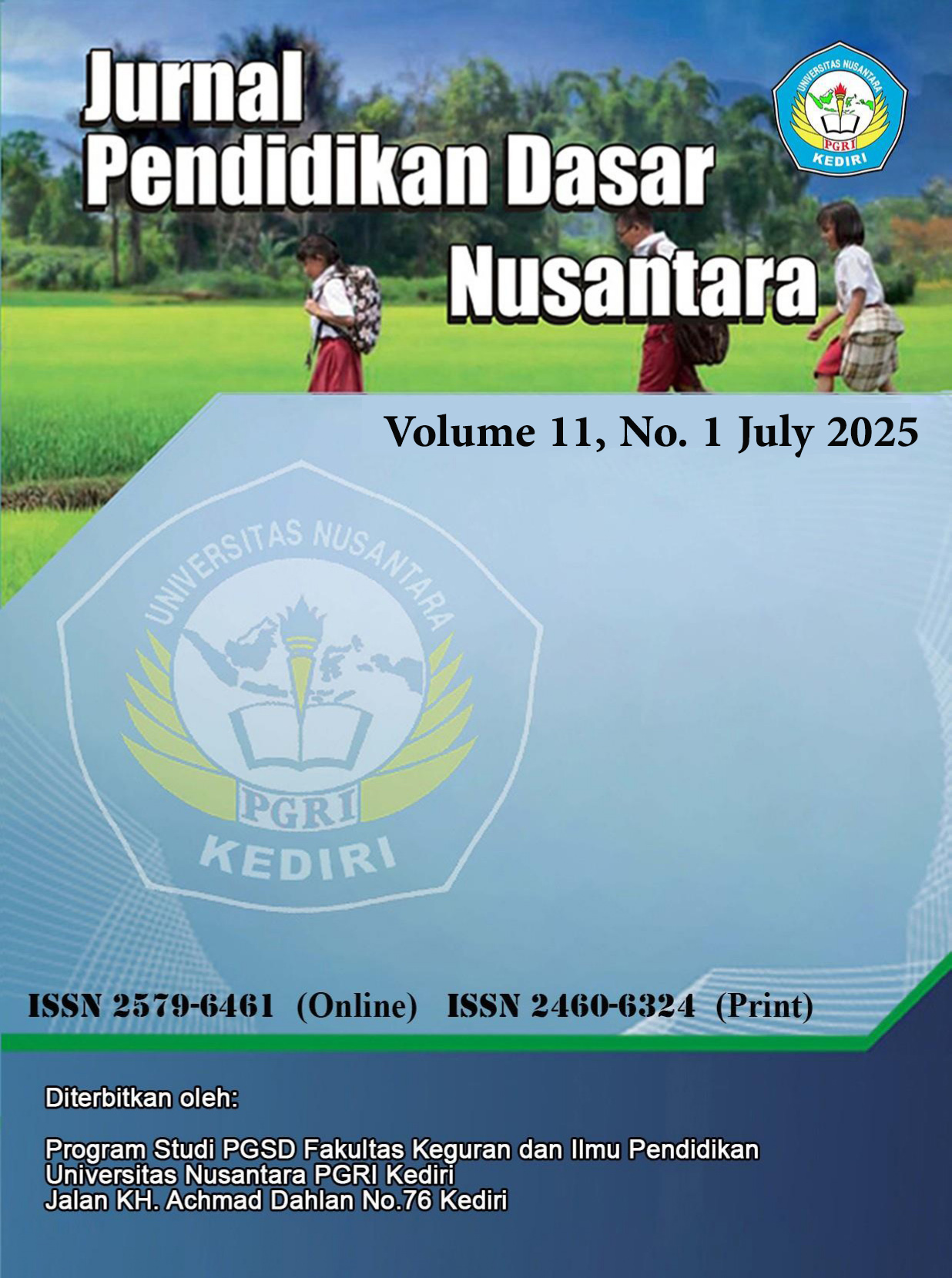The Creation of Dance Music "Seven Habits of Indonesian Children" As a Character Education Media
DOI:
https://doi.org/10.29407/jpdn.v11i1.25855Keywords:
Dance Music, Seven Habits of Indonesian Children, Children's Character EducationAbstract
Character education is a crucial aspect in developing a young generation with integrity. One innovative approach to character education is through the performing arts, particularly dance music. This study aims to create a dance music piece called "Seven Habits of Indonesian Children" as a medium for character education in early childhood. Through an artistic approach and qualitative-descriptive methods, the creation process is carried out in four stages: exploration, improvisation, and evaluation. This study explores how elements of music and dance can be synergized to instill character values in children. The results show that dance music designed with educational aspects in mind can improve students' understanding and internalization of character values. This work has proven to be a fun, contextual, and effective learning medium in instilling character values through an aesthetic approach.
Downloads
References
Agustina, A., & Edi, I. (2025). Penguatan Pendidikan Karakter Siswa Melalui Tujuh Kebiasaan Anak Indonesia Hebat di SMK Negeri 3 Pekanbaru. Pendidikan Dirgantara, 2(1), 38–45.
Arizky, B., & Nurizka, R. (2024). Penanaman Karakter Cinta Tanah Air Melalui Ekstrakurikuler Seni Tari Pada Siswa Kelas II SD Negeri 1 Sribitan. Didaktik : Jurnal Ilmiah PGSD, 10(3), 498–508.
Ashari, I. S., & Indrayuda. (2024). Nilai–Nilai Pendidikan Karakter Dalam Gerak Tari Piring Di Sanggar Pelangi Ranah Minang Di Kota Padang. Jurnal Bintang Pendidikan Indonesia, 02(4), 363–381. https://doi.org/10.24036/jsu.v9i2.110531
Asmi, D., Tinggi, S., Islam, A., Bengkalis, N., Bengkalis, K., & Riau, P. (2024). Peran Seni Musik Dalam Membentuk Karakter Positif pada Anak Usia Dini. JETBUS Journal of Education Transportation and Business, 1(2), 459–465.
Asri, & Deviv, S. (2023). Character Education: A Review of Implementation and Challenges in Schools. Journal of Indonesian Scholars for Social Research, 4(1), 1–6. https://doi.org/10.59065/jissr.v4i1.125
Atsilah, A., Aurelia, A., Adrias, A., & Safitri, S. (2025). Analisis Penerapan 7 Kebiasaan Anak Indonesia Hebat Pada Siswa SD Dalam Pembentukan Karakter Disiplin di Era Digital Jurnal Pendidikan Sains dan Teknologi Terapan. 02(02), 74–78.
Education, I. C. on the F. of. (2022). Unesco Futures of Education Report 2021 Reimagining Our Futures Together: A New Social Contract For Education. Report. https://unesdoc.unesco.org/ark:/48223/pf0000379707
Firnamita, F. I., & Noordiana. (2021). Pendidikan Karakter Melalui Pembelajaran Tari Gerak Dan Lagu Daerah Di Sekolah. PESHUM : Jurnal Pendidikan, Sosial Dan Humaniora, 10(1), 28–40. https://doi.org/10.56799/peshum.v1i1.6
Jannah, L., Az-Zahra, J., & Padmaningrum, D. (2025). Revitalisasi Nilai Karakter Melalui Pagelaran Tari Sanggar. Pengabdian Kepada Masyarakat Nusantara, 6(2), 1766–1772.
Karo-Karo, S., Pardede, M., Simamora, P. R. T., & Tamba, L. (2023). Implementation of Character Education for Students in the Era of Digitalization. Jurnal Penelitian Pendidikan IPA, 9(SpecialIssue), 1402–1407. https://doi.org/10.29303/jppipa.v9ispecialissue.6424
Kepakisan, G., Yudha, I., & Kondra, I. (2024). Introspeksi Diri Sebagai Ide Dalam Penciptaan Karya Seni Lukis. Cita Kara, 4(2), 201–2014.
Lingga, C. S., Tresna, Y. A., & Adzkia, S. F. (2024). Penanaman Pendidikan Karakter Melalui Musik Kolintang Di SD Negeri Rungkut Kidul II Surabaya Character Education Development Through Kolintang Music at Rungkut Kidul II Public Elementary School ,. 18(2), 46–53.
Melissa, Putri, R. W. E., Saputra, H. A., Meliyanta, S. A., & Firmansyah, A. (2022). Membangun karakter anak melalui tari kreasi dolanan anak berbasis kearifan lokal. Trihayu: Jurnal Pendidikan Ke-SD-An, 9(1), 79–88. https://doi.org/10.30738/trihayu.v9i1.13703
Nuryanti, R. (2022). Estetika dan nilai edukatif dalam penciptaan seni berbasis karakter. Jurnal Seni Dan Pendidikan Karakter, 7(2), 112–126.
Ramadhani, O., Marsanda, A., Damayanti, P. D., & Cinantya, C. (2025). Pentingnya Pendidikan Karakter di Sekolah Dasar untuk Membangun Generasi Berkualitas. Penelitian Multidisiplin, 3(1), 151–160.
Santrock, J. W. (2019). Children, Fourteenth Edition (14th ed.). McGraw-Hill Education.
Sari, F. I., & Pradoko, S. (2022). Creative Process of Creating Butterfly Dance as a Means of Growing Educational Value to Elementary School Students. International Journal of Multicultural and …, 9(9), 302–315. https://ijmmu.com/index.php/ijmmu/article/view/3996%0Ahttps://ijmmu.com/index.php/ijmmu/article/viewFile/3996/3517
Setiawan, A. (2023). Musik Sebagai Media Pendidikan Karakter Anak. Musik Dan Masyarakat, 5(1), 54–69.
Suarsningsih, N. M., Santika, I. G. N., Roni, A. R., & Kristiana, R. (2024). Pendidikan Karakter Di Indonesia Dalam Berbagai Perspektif ( Definisi , Tujuan , Landasan dan Prakteknya ). Journal Og Civic Education Reseach, 2(2), 61–73.
Utami, H. E. (2023). Proses Kreativitas dalam Penciptaan Tari Srimpi Pudyastuti. Acintya Jurnal Penelitian Seni Budaya, 15(1), 20–31. https://doi.org/10.33153/acy.v15i1.4857
Downloads
Published
Issue
Section
License
Copyright (c) 2025 Ayu Titis Rukmana Sari, Wahyudi Wahyudi (Author)

This work is licensed under a Creative Commons Attribution-ShareAlike 4.0 International License.
Authors who publish with this journal agree to the following terms:
- Copyright on any article is retained by the author(s).
- The author grants the journal, the right of first publication with the work simultaneously licensed under a Creative Commons Attribution License that allows others to share the work with an acknowledgment of the work’s authorship and initial publication in this journal.
- Authors are able to enter into separate, additional contractual arrangements for the non-exclusive distribution of the journal’s published version of the work (e.g., post it to an institutional repository or publish it in a book), with an acknowledgment of its initial publication in this journal.
- Authors are permitted and encouraged to post their work online (e.g., in institutional repositories or on their website) prior to and during the submission process, as it can lead to productive exchanges, as well as earlier and greater citation of published work.
- The article and any associated published material is distributed under the Creative Commons Attribution-ShareAlike 4.0 International License
































